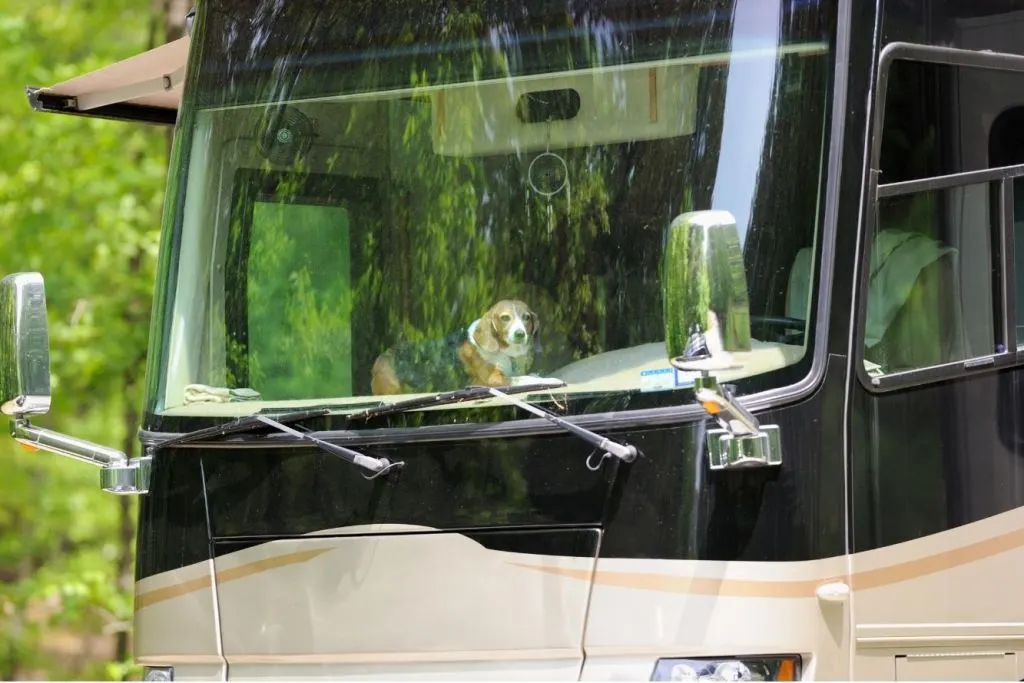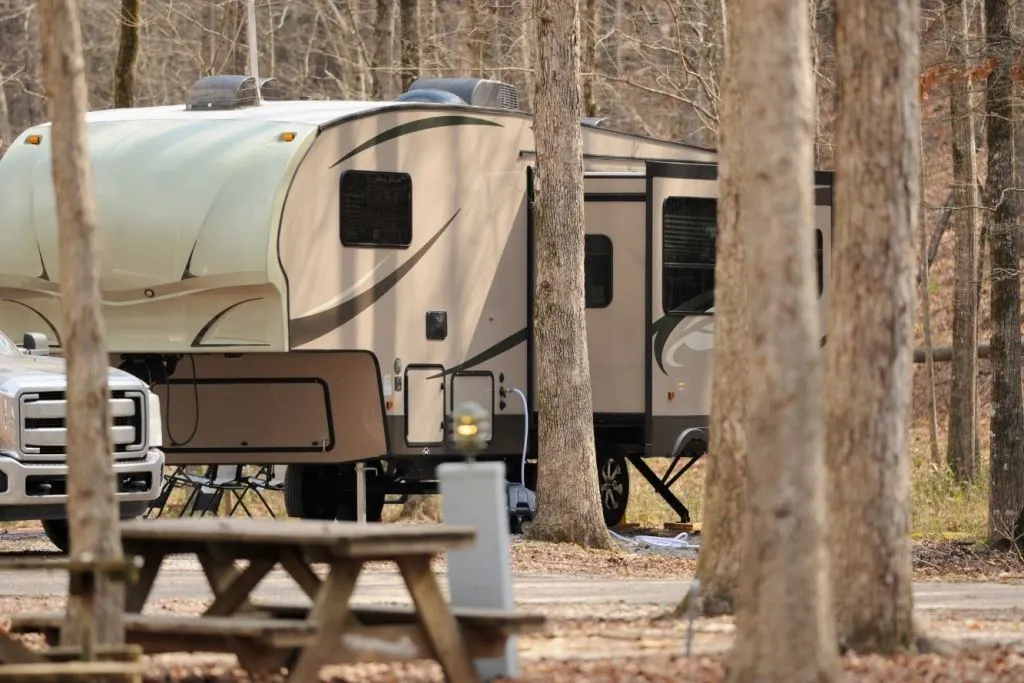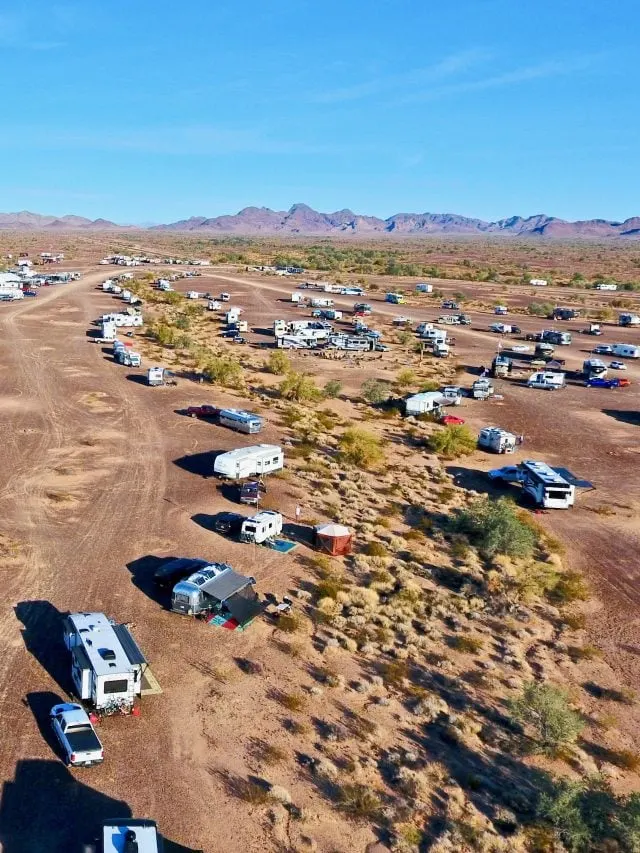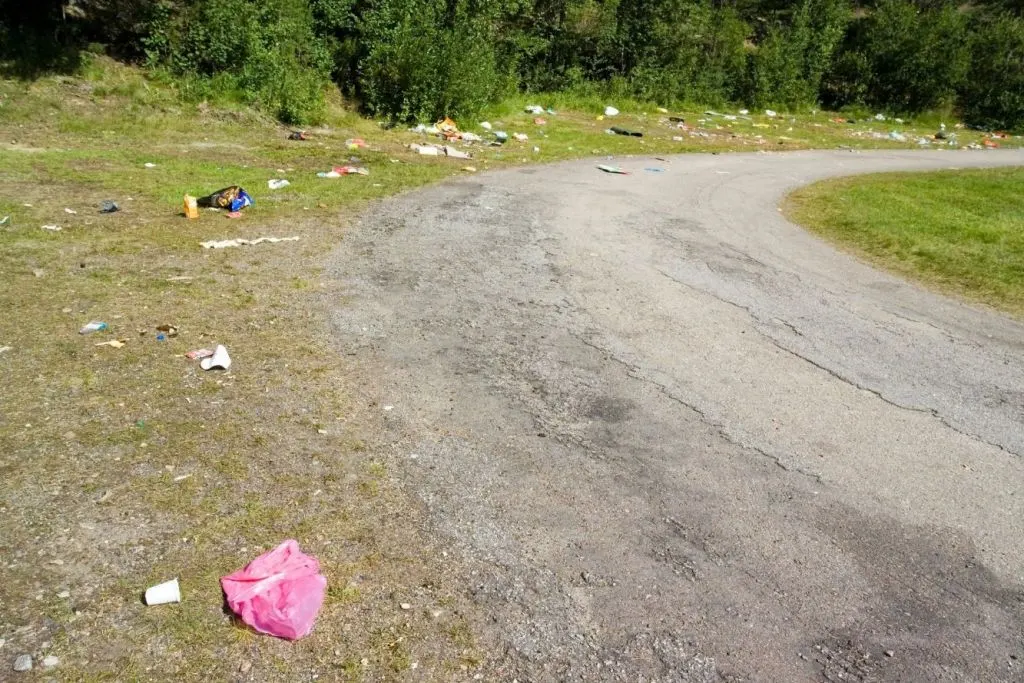RV camping is one of the most fun and relaxing pastimes.
Believe it or not, there are unwritten rules when it comes to RVing. These unwritten rules are often referred to as RV etiquette, although we think it’s all just common sense.
If you’ve spent much time camping, chances are you’ve either seen RVers do these things or maybe you’ve been this RVer yourself.
Here are the 7 deadly sins of RV camping.
1. Dumping Black Water on the Ground
Dumping black water anywhere other than a legally approved dump site is the biggest RV camping sin of all.
Blackwater is raw sewage, and besides the fact that it’s really gross, it’s a biohazard. When your black tank is full, never dump anywhere other than an approved RV dump station.
Black water can contain high amounts of dangerous fungi, bacteria, viruses, and even parasites. Prolonged exposure to these can cause infections, illnesses, and long-term respiratory issues.
Pro tip: if you don’t want to break camp to go dump your tanks, get a portable waste tank to make the job easier.
2. Being a Bad RV Dog Owner
Bringing your dog camping with you is an excellent experience for the whole family. Don’t be a bad RV dog owner!
There are a few traits of bad RV dog owners.
First, bad RV dog owners let their pets run around off-leash. Even if you know and believe that your dog is the most friendly, sociable dog ever, that doesn’t mean other people will think that or be accepting of them.
Also, even if your dog isn’t aggressive towards other dogs, that doesn’t mean that other dogs won’t be aggressive towards your pet. Keeping your dog on a leash is for everyone’s safety.
The second trait of a bad RV dog owner is an obvious one: not cleaning up after your pet. It’s common courtesy. Pack your doggie bags!
Lastly, bad RV dog owners leave their anxious, barking dog alone for hours at a time. This is not only stressful for your pet; it’s a major nuisance for your camp neighbors who came to relax and unwind.

3. Using a Loud Generator
People go RV camping to escape, unwind, and relax, not to listen to your loud generator all day long!
If you’re going camping at a place without electricity and you need power, running your generator is not only inefficient, it’s a nuisance to everyone around you.
You don’t need a solar set up, in fact we have 11 Reasons to Avoid Solar for RVs. However, an inverter generator, like the one pictured below, will be a lot quieter compared to a construction style generator.

Here are the 5 best inverter generators for RVing:
Honda EU2200i: This is a popular and highly rated inverter generator for RVing. It offers 2200 watts of peak power and 1800 watts of continuous power, which is enough to run most RV appliances. It’s also lightweight and compact, making it easy to transport and store.
Yamaha EF2200iS: This is another highly rated inverter generator that’s great for RVing. It offers 2200 watts of peak power and 1800 watts of continuous power, and it’s known for being very quiet and fuel efficient. It also has a smart throttle feature that adjusts the engine speed to match the load, which helps to conserve fuel.
Champion 75537i: This inverter generator offers 3100 watts of peak power and 2800 watts of continuous power, which is enough to run most RV appliances. It also has a remote control, making it easy to start and stop from inside your RV. It’s a bit heavier than some other models, but it’s still portable and easy to move around.
Westinghouse iGen4500: This inverter generator offers 4500 watts of peak power and 3700 watts of continuous power, which is more than enough to run most RV appliances. It also has a fuel efficient engine and a digital display that shows fuel level, power output, and other important information. It’s a bit heavy, but it has wheels and a handle for easy transport.
Generac GP3000i: This inverter generator offers 3000 watts of peak power and 2300 watts of continuous power, which is enough to run most RV appliances. It also has a built-in handle and wheels for easy transport, and it’s known for being very quiet and fuel efficient. It’s also one of the more affordable options on this list.
4. Walking Through Someone Else’s Campsite
Have you ever cut through another campsite at the campground on your way to or from yours? This is a big no-no. Just like you don’t want strangers cutting through the living room of your house, nobody wants strangers cutting through their campsite.
Respect other campers’ personal space and privacy when you’re out camping. Take the long way around to and from your campsite, and teach your kids to do the same.

5. Parking Too Close To Someone Else While Boondocking
Boondocking is dry camping on public lands at non-established campsites. A common mistake many new boondockers make is parking closely to other boondockers, even when there is plenty of room to have your own private camp.
Boondockers usually like their personal space and privacy. Never park closely to another boondocker if you can avoid it, and never block their view! If someone has their camp-side facing a fantastic view, one of the biggest jerk moves you can make is to block it with your rig.
Don’t be that person.
Here are 5 additional boondocking rules to keep in mind:
- Leave no trace: This means packing out all of your trash and leaving the campsite as you found it. Don’t leave any food or garbage out that could attract wildlife, and be sure to properly dispose of any human waste.
- Respect wildlife: Observe wildlife from a distance and avoid disturbing their natural habitat. Don’t feed wild animals, as this can disrupt their diet and behavior, and make them more aggressive towards humans.
- Stay on designated roads and trails: Stick to established roads and trails to minimize your impact on the environment and avoid damaging delicate ecosystems. Avoid driving off-road or creating new trails, as this can damage vegetation and wildlife habitat.
- Respect other campers: Keep noise levels low, especially during quiet hours, and don’t park too close to other campers. Be considerate of your neighbors and avoid disturbing their privacy.
- Conserve resources: Boondocking often means limited resources, such as water and fuel. Be mindful of your water usage, and conserve energy by using solar panels or a generator sparingly. Use a camp stove instead of a fire for cooking, as fires can damage the environment and create safety hazards.

6. Leaving Outdoor Lights on All Night
Leaving outdoor lights on all night is a significant nuisance for other RV campers, especially if you’re boondocking. You might not realize it, but your lights may be shining right into another RVers bedroom or polluting their view of the night sky.
One of the biggest complaints in RV camping groups and forums is about neighbors leaving on bright lights all night. When you’re done hanging out outside, turn them off.
7. Trashing Your Site
Lastly, one of the worst sins of RV camping is trashing your site. Whether you’re at an established campground or boondocking, trashing your site is a major jerk move.
New boondocking sites get shut down every year due to RV campers not cleaning up after themselves. This puts a significant strain on local resources and, as a result, causes problems for RVers looking for free camping.
Always leave a campsite better than you found it. If you see trash, pick it up! Whether you left the garbage or not, it is our responsibility as public land users to help keep them clean.
And if you’re at a developed campsite, practice the same mentality. It’s good RVer etiquette!

Practice Good RV Etiquette
Practicing good RVer etiquette is as simple as being respectful and using common sense.
Clean up after yourself and your pets, be mindful of the experience of those around you, and properly maintain your RV.
It may seem crazy that some of these things have to be said, but every one of these 7 deadly sins has been committed by many unaware campers. Don’t let the next one be you!
Discover the Best Free Camping Across the USA
To be honest with you, we hate paying for camping. There are so many free campsites in America (with complete privacy).
You should give it a try!
As a matter of fact, these free campsites are yours. Every time you pay federal taxes, you’re contributing to these lands.
Become a FREE CAMPING INSIDER and join the 100,000 campers who love to score the best site!
We’ll send you the 50 Best Free Campsites in the USA (one per state). Access the list by submitting your email below:
Good article. I would only add that generators are not only noisy but smelly as well. Who wants to go out to hear and smell nature and wind up smelling gas or diesel fumes. Do people really need to run their generator every morning and afternoon? Is their battery bank undersized for their needs?
Thank you for touching on two of my biggest camping/trailer/RV pet peeves: boondocking too closely and leaving lights on at night. I, as most others, camp to get away from the urban life where I have neighbors. I do my best to get out and away, and find seclusion, enjoy nature, and the beautiful stars in the night sky. The way I camp, most people do my even know I’m there. Sure wish everyone camped that way…
Hard to comprehend anyone would dump black or gray tanks on the ground, but apparently there are idiots out there. Everybody has a dog, most are good pet owners, but always a few that ruin it. Smokers!!! Pick up your butts, keep camp spot tidy. We all enjoy music, keep it low. Lithium battery portable AC units available so running generator to cool not necessary.
Safe travels!
RTinAZ
The one thing that was not Stated
LOUD music
Early in the Morning or Late at night
On the use of generators, don’t be so biased to think that there are no handicap or disabled or elderly campers that require a generator. If you’re actually camping, then consider going to another spot, if you don’t have any tolerance at all. I have found many more instances of obnoxious music, being played on outside speakers, unnecessarily loud!